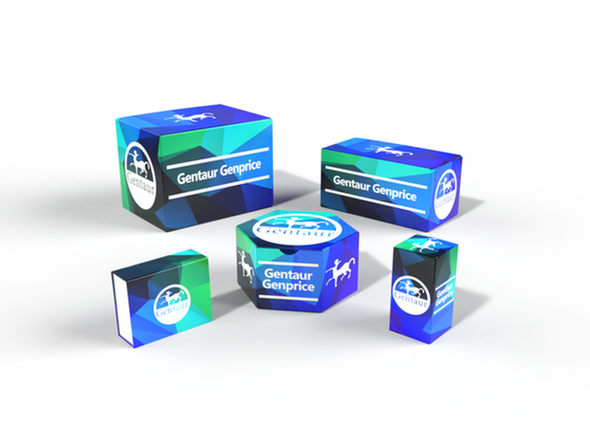740
Human Sodium/iodide cotransporter (SLC5A5) ELISA Kit | AE18429HU
- SKU:
- 740-AE18429HU
- Availability:
- Usually ships in 5 working days
Description
Human Sodium/iodide cotransporter (SLC5A5) ELISA Kit | AE18429HU | Gentaur UK, US & Europe Distribution
Species Reactivity: Human (Homo sapiens)
Abbreviation: SLC5A5
Alternative Name: NIS; TDH1; Na (+) /I (-) cotransporter
Application: ELISA
Range: 0.156-10 ng/mL
Sensitivity: 0.059 ng/mL
Intra-Assay: ≤4.3%
Inter-Assay: ≤6.5%
Recovery: 0, 96
Sample Type: Serum, Plasma, Other biological fluids
Detection Method: Sandwich
Analysis Method : Quantitive
Test Principale: This assay employs a two-site sandwich ELISA to quantitate SLC5A5 in samples. An antibody specific for SLC5A5 has been pre-coated onto a microplate. Standards and samples are pipetted into the wells and anySLC5A5 present is bound by the immobilized antibody. After removing any unbound substances, a biotin-conjugated antibody specific for SLC5A5 is added to the wells. After washing, Streptavidin conjugated Horseradish Peroxidase (HRP) is added to the wells. Following a wash to remove any unbound avidin-enzyme reagent, a substrate solution is added to the wells and color develops in proportion to the amount of SLC5A5 bound in the initial step. The color development is stopped and the intensity of the color is measured.
Product Overview: The sodium-iodide symporter (NIS) is an ion pump that actively transports iodide (I-) across the basolateral membrane into thyroid epithelial cells. The NIS a member of the sodium/solute symporter family.Active transport of iodine into the thyroid gland is an important step in the process of iodide organification and the formation of triiodothyronine (T3) and thyroxine (T4) . The symporter is stimulated by TSH, thereby increasing iodine uptake and iodination of tyrosine.The pump symports two sodium ions for every iodide ion. This symporter is driven by low internal sodium concentration in the thyroid epithelial cells, via facilitated diffusion, caused by the sodium/potassium ATPase pump.This pump is the target of certain anion based inhibitors such as perchlorate, pertechnetate, and thiocyanate.
Stability: The stability of ELISA kit is determined by the loss rate of activity. The loss rate of this kit is less than 5% within the expiration date under appropriate storage condition. The loss rate was determined by accelerated thermal degradation test. Keep the kit at 37°C for 4 and 7 days, and compare O.D.values of the kit kept at 37°C with that of at recommended temperature. (referring from China Biological Products Standard, which was calculated by the Arrhenius equation. For ELISA kit, 4 days storage at 37°C can be considered as 6 months at 2 - 8°C, which means 7 days at 37°C equaling 12 months at 2 - 8°C) .






